As the Missouri House began its 2026 regular session, Representatives Lane Roberts (R-Joplin) and Jim Schulte (R-New Bloomfield) were presented with pins recognizing their service in Vietnam. They received their pins from fellow veteran and Chairman of the House Veterans and Armed Forces Committee, Representative Dave Griffith (R-Jefferson City), who was introduced by Representative Don Mayhew (R-Crocker).
Tag: Dave Griffith
VIDEO: Missouri House Veterans Recognition Day 03-27-2025
The Missouri House’s annual Veterans Recognition Day was this morning in the State Capitol Rotunda. It was led by Veterans Committee Chairman Dave Griffith (R-Jefferson City) as well as House Speaker Jon Patterson (R-Lee’s Summit).
Missouri House legislative effort to stem veteran suicide continues
Veteran suicide is an issue the Missouri House of Representatives has sought to address for some time, and in the past year it touched the life of the man who has led that effort. He entered the 2024 legislative session with renewed passion to see his legislation become law.
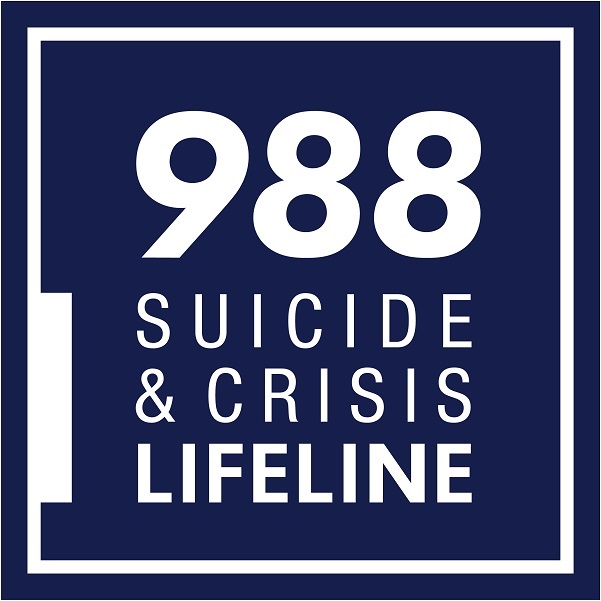
The House last year voted 156-0 in support of requiring the Missouri Veterans Commission to come up with recommendations on how veteran suicide can be prevented; and to report annually on new recommendations, and the implementation and effectiveness of state efforts. That bill was approved 8-0 by a Senate committee but did not reach passage in that chamber. This year the proposal is back, and is one of the first House measures to get a committee hearing.
Representative Dave Griffith (R-Jefferson City) is the sponsor of House Bill 1495. He is a U.S. Army Veteran and the chairman of the House Veterans Committee, which held that hearing.
“It’s a topic that is near and dear to my heart. It’s one that I feel like … we’re not making a great deal of success and progress in preventing suicide,” Griffith told his colleagues.
Griffith said Missouri agencies are actively working to stem veteran suicide.
Kerchoff told the committee the data on suicide rates has not been encouraging.
“Suicide rates in Missouri continue to be high … active duty suicides are the highest since the great depression. In 2019 there were 188 veteran suicides, 2020 there were 174 in Missouri, and Missouri is significantly higher than the national average for veterans,” Kerchoff said. “Our rate [of veteran suicides] is 45.2 per 100,000, but to give you the national average is just 33.9, so Missouri’s is significantly higher than the national average.”
Asked why the rate in Missouri exceeds the national average, Kerchoff said the answer isn’t known, and that’s one more reason why he wants to see HB 1495 pass.

Kerchoff said the issues that impact the mental health of veterans require specialized understanding and approaches.
Representative Jim Schulte (R-New Bloomfield), in speaking to the stigmas facing veterans seeking mental health help, talked about a friend who did get treatment. He was then, initially, denied reentry to the National Guard because he’d sought treatment.
“We’ve got to overcome this stigma. We tell everybody we’ve got these help lines, we have these programs, but they’re leery of every doing them because then we stigmatize them and label them,” said Schulte. “In the name of, we say we want to help, we’re putting a badge on them that’s not a positive thing.”
A number of state agencies, including the Missouri House, have worked to drive up awareness of the 988 Suicide and Crisis Lifeline, and Griffith said that remains one of the best resources available for those seeking help.
“The number of calls that we’re getting in the State of Missouri has far exceeded what they ever thought it would. In the first month they had over 20,000 calls,” Griffith told the committee.
Griffith and the staff of House Communications spent time this past summer creating a series of public service announcements for radio, television, and social media that target suicide and specifically veteran suicide. Those will soon be available for circulation.
The Veterans Committee voted unanimously to advance HB 1495.
House efforts target suicide especially among veterans
One House member continues his push to reduce suicide in Missouri, particularly among the state’s veterans.

Representative Dave Griffith (R-Jefferson City) has made veterans’ issues a priority throughout his five years in the House, and now chairs the chamber’s Veterans Committee. Over the summer he also chaired an interim committee on Veterans’ Mental Health and Suicide.
Griffith said one of the most important things that committee learned is that in Missouri the 988 Suicide and Crisis Hotline is not fully funded.
Griffith is again this year sponsoring legislation to give guidance to the Missouri Veterans Commission about how to use the data it collects on veteran suicides, as well as to require it to report annually to the legislature on that data and what it’s doing to reduce the number of those incidents.
“Where we rank in this in the entire country is not good,” Griffith told the House Committee on Health and Mental Health Policy, saying Missouri is around fourth or fifth among the states with the most veteran suicides.
He added that even though his proposal, which this year is House Bill 132, didn’t pass in 2022, the Commission is already doing much of what it would require.
“Their heart’s in the right place and I can tell you that they get it and they’re dealing with it.”
Griffith said his aim is not just to increase awareness about mental health and suicide in the military and veteran communities but among the population as a whole.
This week Griffith presented HB 132 to Veterans Committee and presented the report from his interim panel to the Committee on Health and Mental Health Policy, showing that the issue is again his top priority as the 2023 session gets underway. He spent much of both presentations speaking about the 988 hotline because of the importance of listening to those considering suicide, whether it be when they call the hotline or in other settings.
He said one thing discussed at a recent symposium on suicide in the military community that resonated with him is a question that was put to commanders: “Do you really know your personnel?” He said the same could be asked of managers in the private sector.
“In order for us to be able to make a difference they’ve got to be able to know and be able to identify and recognize when there’s something going on in [their subordinates’] lives,” said Griffith. “What my hope was, is we can take that same model and we can bring that into the private sector. We’ve got companies like Scholastic and we’ve got Hitachi, we’ve got Westinghouse, large companies across the State of Missouri and each one of them have got supervisors. If we can train those supervisors and we can get people that have got the aptitude and really the forthrightness to be able to do something like that, it’s something that I hope we can learn from our military background and military friends.”
Griffith’s proposal passed out of the House unanimously last year but didn’t reach Governor Parson. The Veterans Committee will likely vote on it soon.
House measure aims to boost suicide awareness and prevention, promote 988 Crisis Lifeline
The Missouri House has taken time in the waning days of the session to pass a bipartisan effort to address suicide awareness and prevention.

It sent to the Senate House Bill 2136, the “Jason Flatt/Avery Reine Cantor Act,” which would require public schools, charter schools, and public higher education institutions that print pupil identification cards to print on those cards the new three-digit number for the National Suicide and Crisis Lifeline, 988.
“988 is going to be our new mental health suicide hotline beginning in July, so this is going to encourage school districts to get that out there to the public so that we can start using that,” explained the bill’s sponsor, Representative Ann Kelley (R-Lamar).
The bill also contains provisions meant to equip and encourage pharmacists to identify possible signs of suicide and respond to them. This includes the “Tricia Leanne Tharp Act,” sponsored by Representative Adam Schwadron (R-St. Charles).
The bill was amended to make sure all pharmacists can participate in that continuing education, regardless of where they work. That change was offered by Representative Patty Lewis (D-Kansas City), who said, “All licensed pharmacists, whether they work inside the four walls of the hospital in an acute care setting or in retail pharmacy [would] have the opportunity to participate in the continuing education to address suicide prevention because there’s such a great need.”
Bolivar representative Mike Stephens (R) is a pharmacist, and said he and others in that profession are well-positioned to be able to identify and work to prevent suicide.

Similar language will allow teachers and principals to count two hours in suicide-related training toward their continuing education.
The bill advanced to the Senate 142-0 after several members spoke about their own experiences regarding suicide.
Festus Republican Cyndi Buchheit-Courtway told her colleagues that every seven hours someone commits suicide in Missouri. It’s the tenth leading cause of death in the state and the second leading cause among those aged 10 to 34.
“When you think about age 10 all the way up to 34 this is covering all of our children in schools and college when they first get out of school and they’re finding their first jobs or meeting someone and becoming a family, and I think that anything that we can do to bring awareness to this issue is just incredible,” said Buchheit-Courtway. “Mental health awareness is so important to so many of us here.”
Representative Dave Griffith (R-Jefferson City) said he knows of a 14 year-old who committed suicide two months ago, just south of the capital city.

“He did it because he was being bullied in school and he felt there was no other way out and he couldn’t talk about it. It became very obvious to that community the need for us to be able to talk and have some kind of tools in our hands to be able to prevent these types of tragic events,” said Griffith. “The suicide prevention hotline number, I believe every school will put it on their cards. There’s no reason for them not to do that.”
Representative Rasheen Aldridge, Junior (D-St. Louis) told the body, “One of my good friends in high school, best friend … who is also between that age that the lady talked about, only in 10th grade, committed suicide … it takes a toll on loved ones, it takes a toll on friends, it takes a toll on people that love that individual and all individuals that have committed suicide.”
The legislation stems partly from the work of the Subcommittee on Mental Health Policy Research, of which Lewis is a member and Buchheit-Courtway is the chairwoman.
The school-related provisions of the bill would take effect in the 2023-24 school year.
House member wants to favor family placements over foster care
A House member wants the state to put more effort into finding family members with whom to place children who are taken into state custody, before placing them with strangers.
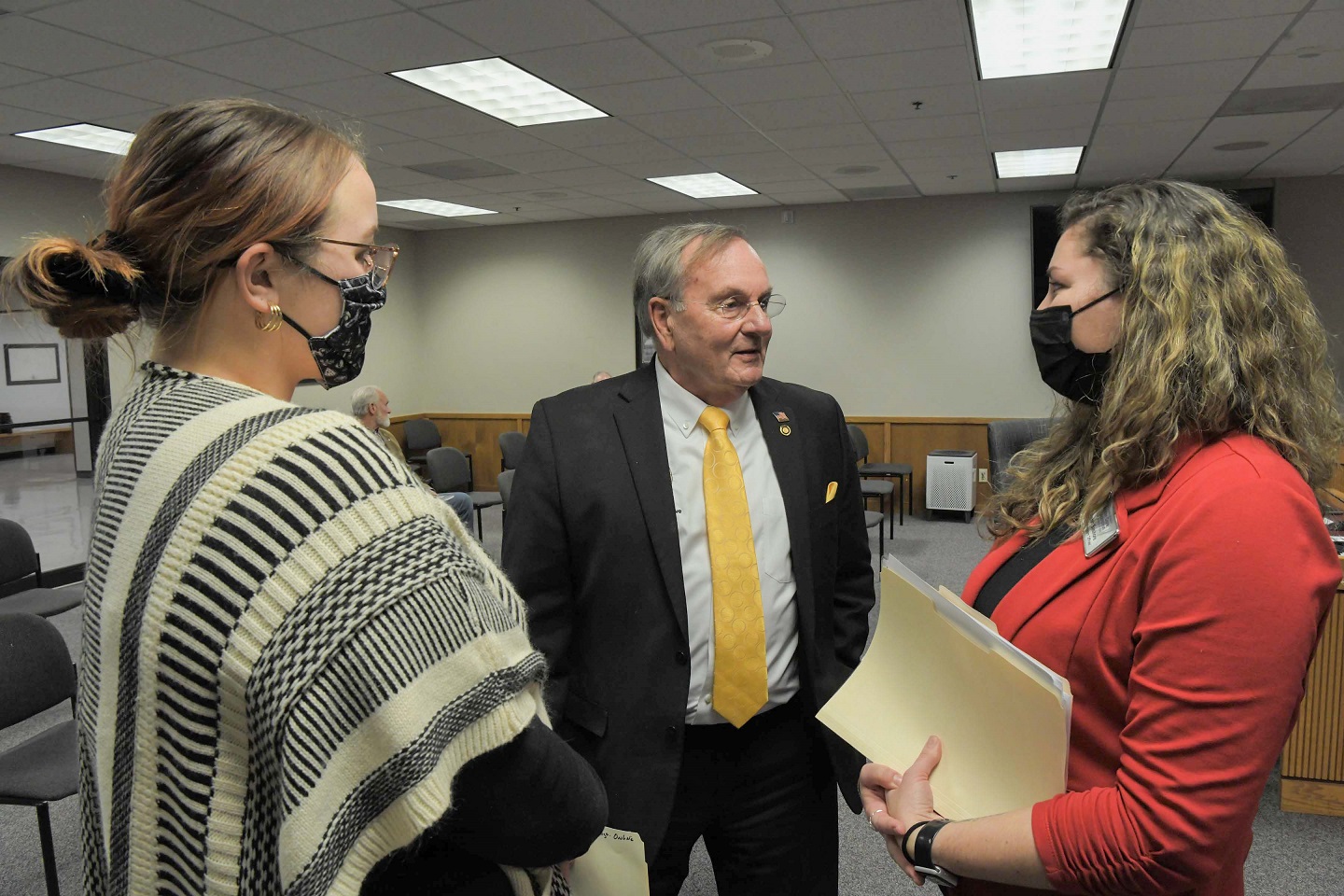
Jefferson City representative Dave Griffith (R) thinks the state Children’s Division could do more to that end, and some agencies who support his bill agree with him.
“We want to go 50 deep if we have to, to try to find somebody that is going to be a good match for that child, that is going to be able to provide that child with a safe and healthy place to live,” said Griffith. “It really comes down to what is going to be best for the child or the children, and trying to keep children and families together rather than separating families.”
Griffith said he has heard from a number of constituents who have their own, “stories and their own personal nightmares that they are dealing with when their children are taken from them and trying to get their children back and … having their children separated and not being able to go to relatives, or going to wrong relatives and it being injurious to their future, and many of them, to their health.
Griffith’s House Bill 1563 would require the Division to make “diligent searches” for biological parents when a child enters state custody. In the case of an emergency placement, the Division would search for grandparents. If they can’t be found or aren’t fit, it would then look for other relatives for placement within 30 days.
Members of the House Committee on Emerging Issues asked Griffith whether his proposal would simply place burdens on overworked, underpaid, members of an understaffed agency. Griffith agreed those are concerns for the Division, “but I think that there are resources that are available to [the Division] which are not being utilized to the fullest. I think if we can utilize these agencies … those are a resource that they can use … and we already have them under contract.”
Sarah Bashore with the Central Missouri Foster Care and Adoption Association told the committee that her agency, serving 24 counties, helped find family members for 34 children in state care in the last two quarters of the last fiscal year. She said it could help even more children, but the Children’s Division hasn’t being asking.
She believes as employees with the Division leave and are replaced, those new hires simply don’t know that her agency and others like it are available, or how they can be used.
She said similar agencies cover other parts of the state, “So we would just ask that we continue doing our work and, if at all possible, if they do some of the work as well then I think, combined, that we’ll see a lot less kids in stranger foster care.”
Bashore said her agency and others are simply more capable and have more resources than Children’s Division for doing the kinds of searches that Griffith’s bill would require, and with compelling results.
Bashore added, there could be an additional benefit to the state if more children were placed with family members rather than in foster care.
“For a child to remain in foster care it’s more than $25,000 a year,” said Bashore.
The committee has not voted on Griffith’s proposal.
House votes to allow state inspections of religious-based youth homes
House lawmakers voted this week toward ending abuse of children in residential care facilities managed by religious organizations – abuse that lawmakers called “horrific,” and amounting to “torture.”
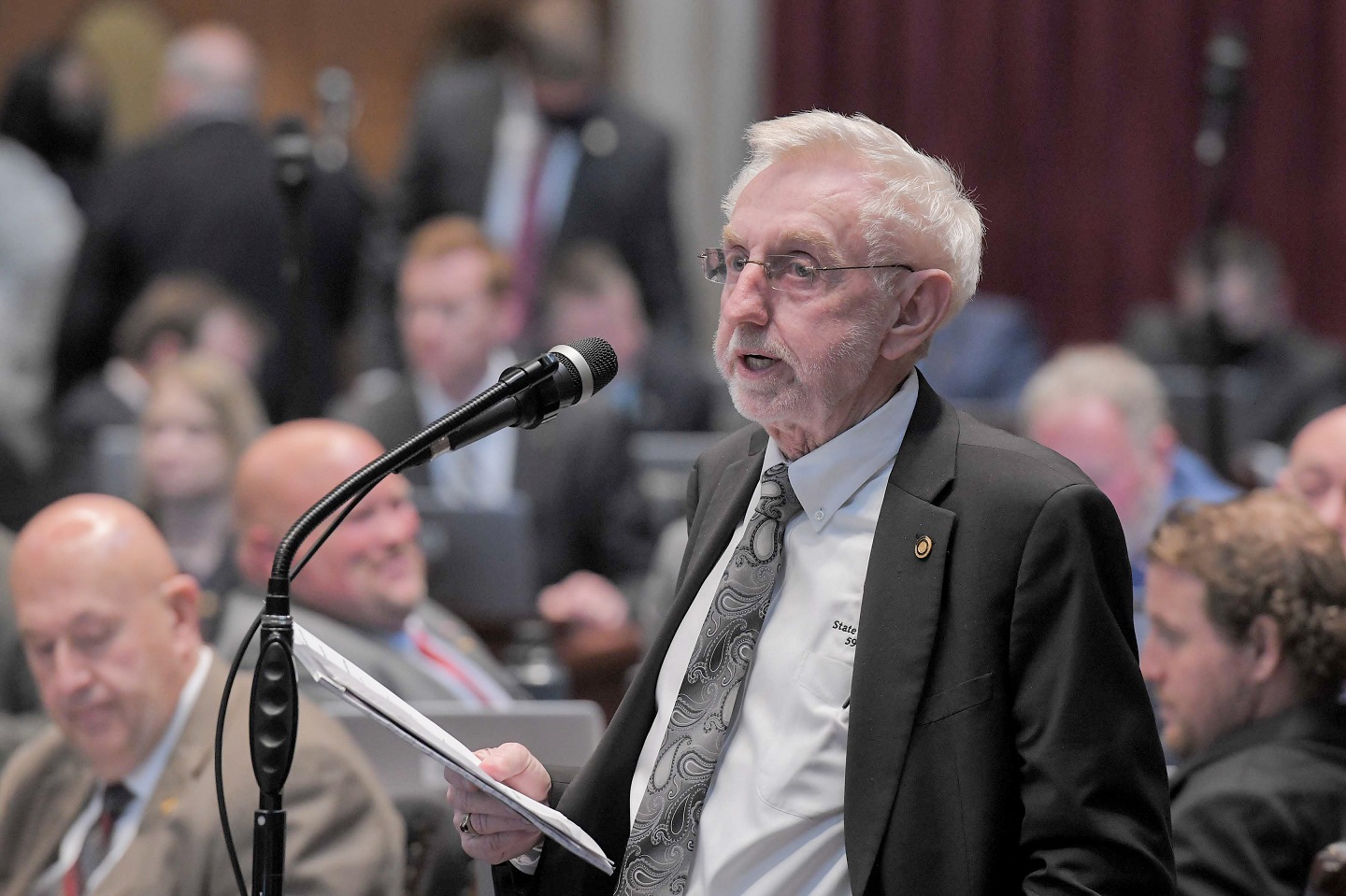
House Bills 557 & 560 would eliminate the exemption from state supervision for such homes.
“There’s no background checks, there’s no right to go in and check on the children, there’s no requirement they keep medical records, there was no right to go in and have eyes on the children, and there was absolutely no control over these homes,” said bill sponsor Rudy Veit (R-Wardsville). “These homes, all you had to say was it was a religious organization … and you couldn’t even check into whether it was a recognized religious organization.”
Lee’s Summit representative Keri Ingle (D), who filed an identical bill, said Missouri is one of the only states that doesn’t oversee religious-based youth homes. Because of that, bad actors have been coming here and then seeking out children with behavioral issues, mental issues, or whose needs weren’t being met.
She said parents would send their children to these homes, “I think, most of the time, with the full intent of getting a child out of a really desperate situation and getting them the help that they needed. Unfortunately, that trust was completely violated and these children were tortured. There’s really no other way to describe it.”
She and other lawmakers heard in committee hearings from children who had been abused in these homes.

“It almost looks like you’re reading something from a script of a horror movie, but it’s not,” said Representative Dave Griffith (R-Jefferson City).
The legislation would require those homes to provide background checks for all employees; notify the state of their location; and allow Social Services to see children when abuse is suspected.
It would not allow the state to change a home’s religious teachings or foundation. Viet said he believes that religious-based youth homes, when run properly and honestly, can benefit children.
The bill would go into effect immediately upon being signed by the governor.
The house voted 148-0 to send it to the Senate.
House votes to require veterans courts in all jurisdictions in Missouri
Every circuit court in the State of Missouri would have to have at least one veterans treatment court in its jurisdiction under a bill approved by the Missouri House.

Treatment courts utilize an intensive program of court supervision, drug or alcohol testing, and rehabilitation to help defendants overcome substance abuse, mental, emotional, or behavioral issues and keep them from re-offending.
Veterans treatment courts specifically focus on those who have served or currently serve in the military. Many of their needs, including drug testing, utilize the Veterans Administration’s services.
Lawmakers said there is one circuit in the state that does not have a treatment court program.
House Bill 547 would require every circuit court in the state to establish a treatment court division. For courts in which resources are not available for a veterans court, it would allow defendants who are veterans to have their cases transferred to any court in the circuit.
The bill is sponsored by Jefferson City representative Dave Griffith (R), who served in the Army as a Green Beret.
“When a soldier, a sailor, a marine, or an airman goes into battle, that experience changes who they are, and many of them come out of that experience and that situation different people. They make decisions they very well would not have made prior to going on the battlefield. Many turn to alcohol or drugs and because of those choices they can find themselves on the wrong side of the law,” said Griffith. “The veterans treatment courts throughout the state will give these men and women an opportunity to clear their names, to get a clean record, and give them a second chance at life, but more importantly it will show them that we have not given up on them.”
Griffith said passing HB 547 would help mitigate the number of suicides among veterans in Missouri.
The bill would specify that veterans who had been in combat would be given preference by courts in determining whether to have their cases handled by a veterans court. That provision was offered by Pleasant Hill Republican Mike Haffner, a retired Naval Officer and decorated combat veteran.

“Let’s face it. Men were never meant to kill men,” said Haffner. “Every individual that goes into combat is changed psychologically. They are never the same again, and the part that’s hard about this is the assimilation when we come back home. For those that haven’t been in combat they don’t understand, coming into a room like this is not the same. We’re forever changed … some can cope and some cannot.”
Some lawmakers expressed concerns about having courts prioritize combat veterans ahead of non-combat veterans, but Haffner maintains that no one who could benefit from veterans courts will be turned away.
Griffith thanked his colleagues for supporting the bill and said it is a further effort to honor veterans.
“When I was separated from the service my first sergeant told me not to wear my uniform home, but to wear civilian clothes. As many of us walked through airports either returning home from deployment or separating from the service, we were cursed at, we were spit on, we were called ‘baby killers,’ and the list goes on and on. Today when I look on Facebook and I see posts of soldiers receiving standing ovations in airports when they are making their way to their planes it brings a tear to my eye.” said Griffith. “This bill will further support our veterans and military by giving them another resource to help them get the support they need so very badly.”
HB 547 would give courts until August 28, 2021 to establish a treatment court division. The House voted 149-3 to send the bill to the Senate.
House pushes mental health awareness after death of members’ family friend
The sponsor of mental health legislation said that issue hit close to home for her on the day her bill came to the House floor.
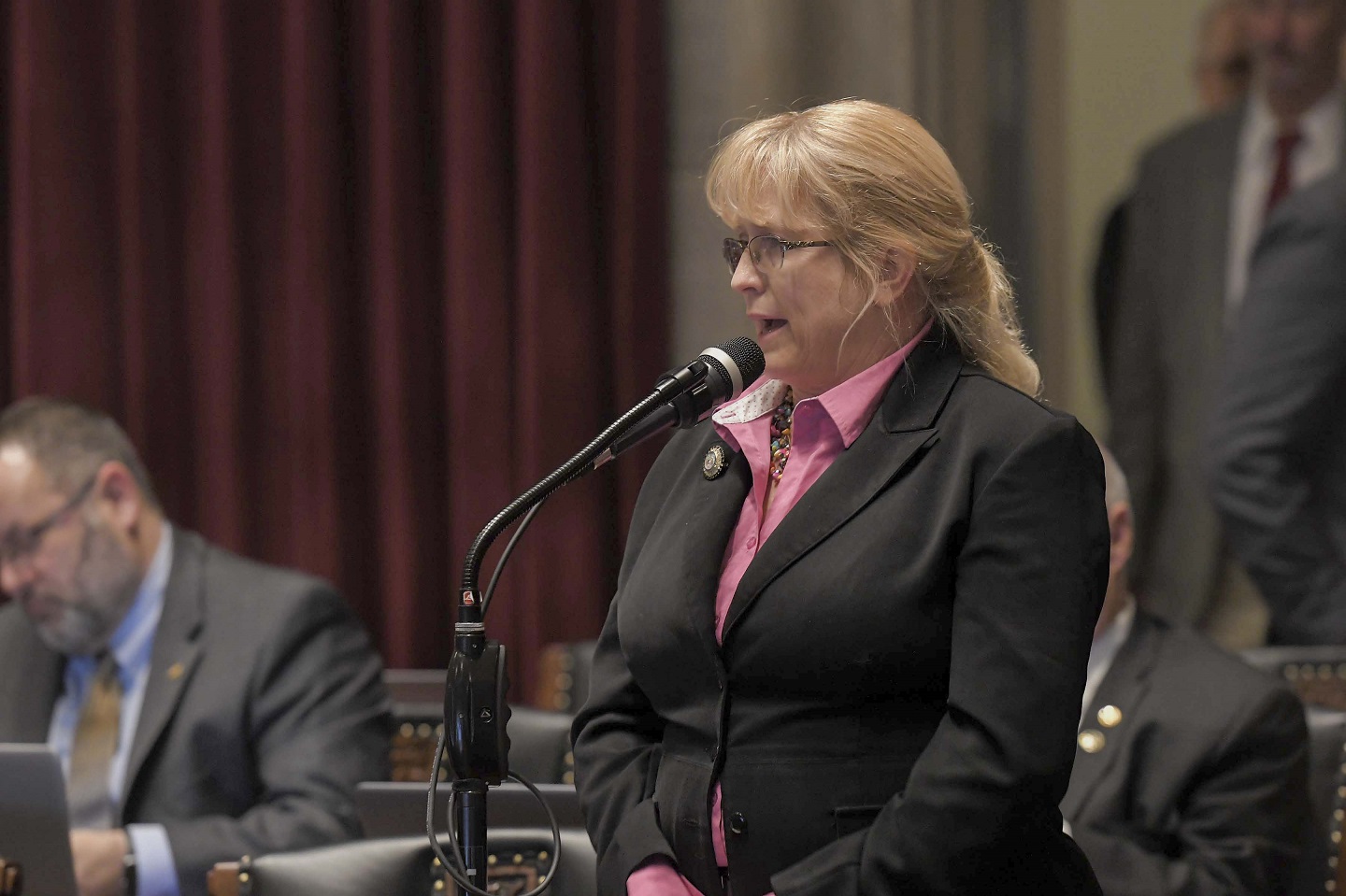
St. Charles Republican Chrissy Sommer said that during her drive to the Capitol on Monday she received the tragic news that the mother of her daughter’s best friend had committed suicide.
“You may have noticed I’m a little shaky and nervous, and the reason is because on my way here today I found out that a friend of mind committed suicide, and I’ve been thinking about her a lot,” said Sommer. “It really struck me that this [bill] was pulled up today … because it can affect everyone.”
The House gave initial approval to House Bill 108, which would have Missouri join the federal government in making May “Mental Health Awareness Month,” and in making July “Minority Mental Health Awareness Month.”
Sommer said untreated mental health contribute to things like unemployment, disability, homelessness, incarceration, substance abuse, and suicide.
The House heard that there are particular stigmas and disparities within minority communities regarding mental health.
St. Louis Democrat Bruce Franks, who speaks openly about numerous traumas in his life including seeing his brother fatally shot when they were both children, said he has contemplated suicide in the past. He said there is a stigma in the African American community about getting help and what “mental health” is.”
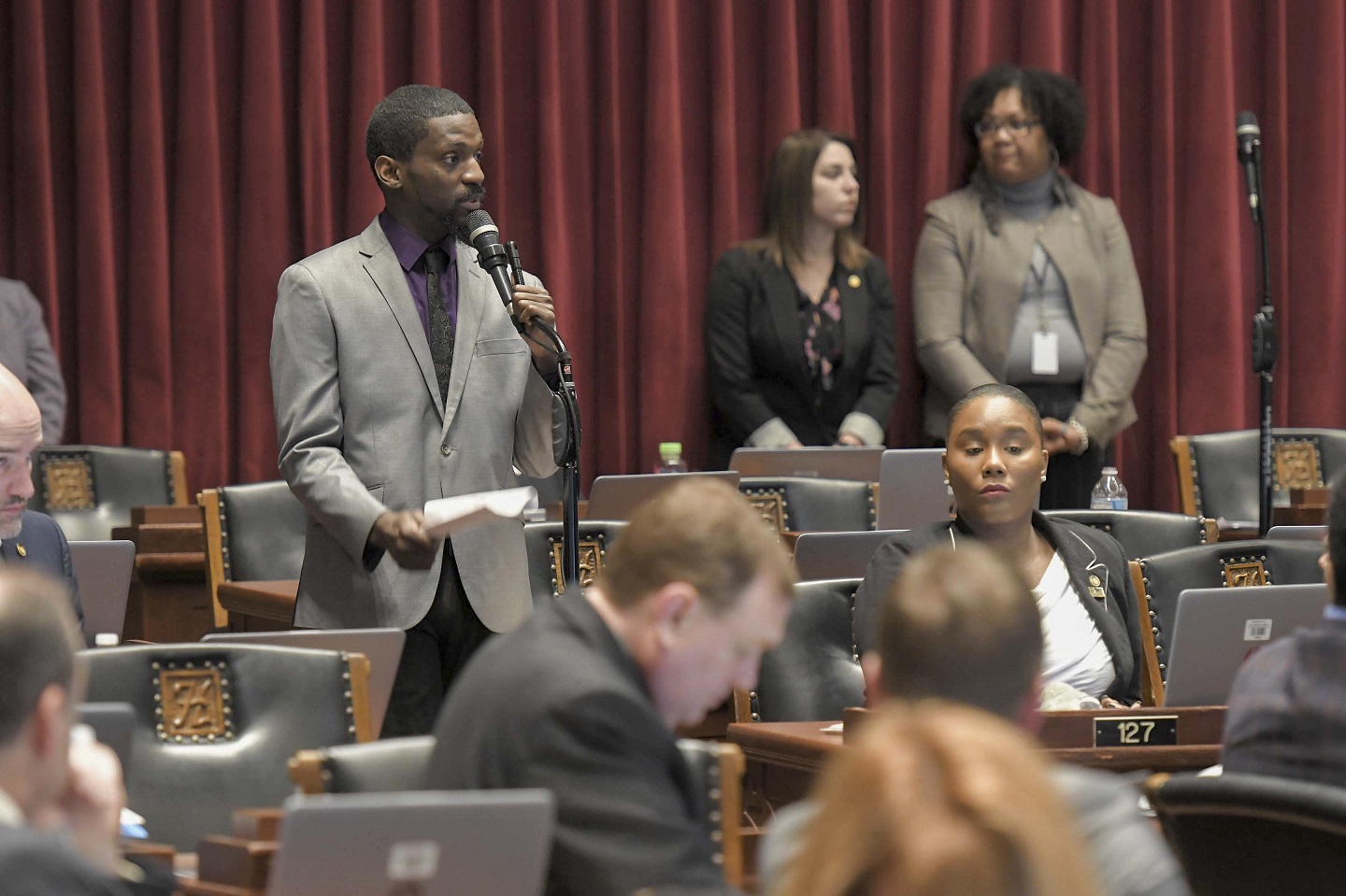
Franks said the legislation is “very important, and it’s not just about an awareness month. It’s about education and empowering people to let them know it’s okay to not be okay but it’s okay to seek help.”
Jefferson City Republican Dave Griffith said he hopes raising awareness will cause more struggling veterans to get help.
With the House’s action on Monday, one more favorable vote would send HB 108 to the Senate.